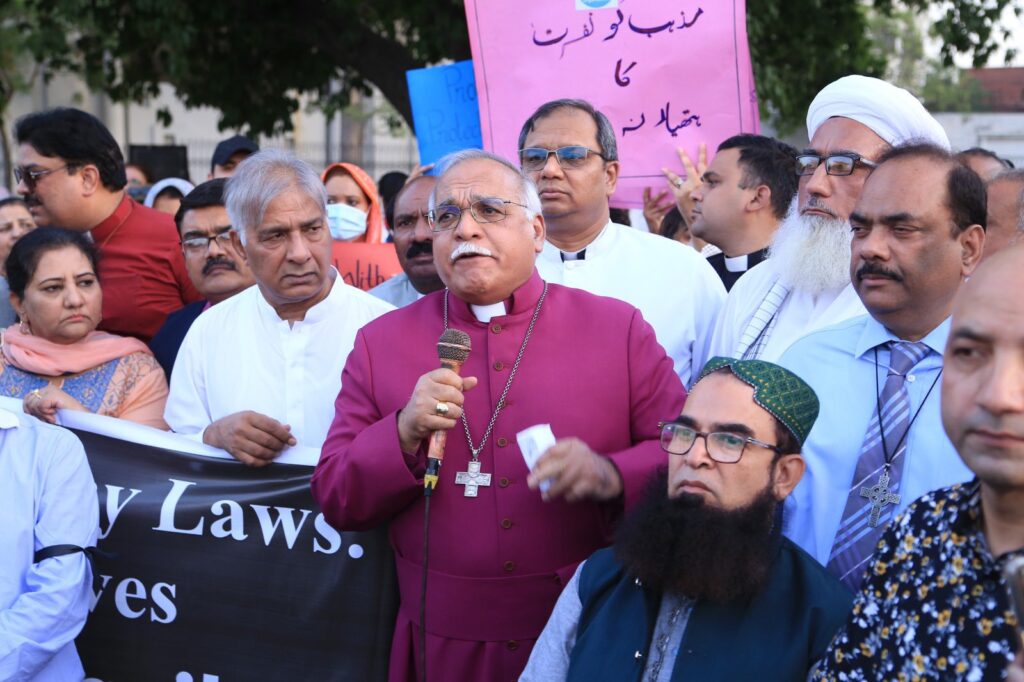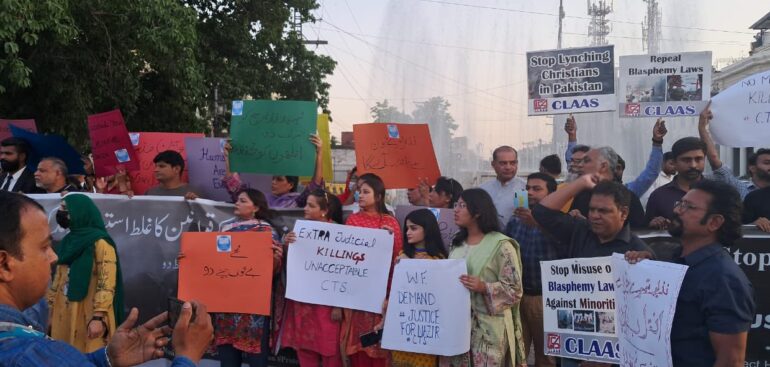Civil society organizations urge the Punjab government to ensure that those responsible for the lynching of the elderly Nazir Masih are brought to justice. The investigation of this heinous act must be conducted transparently and independently, free from any external influence.
Furthermore, the Punjab government must provide compensation to Masih’s family and ensure their safe return following the ransacking of their homes and the shoe warehouse. A comprehensive policy and strategy must be developed to manage provocative announcements in mosques and the resulting mob violence.
These demands were articulated during a peaceful demonstration on June 8, 2024, held from 6 p.m. to 8 p.m. at Chairing Cross, opposite the Punjab Assembly on The Mall, Lahore. The event was attended by a significant number of lawyers, religious leaders, scholars, parliamentarians, community leaders, youth leaders, students, and teachers.
Participants called for the expedited trial of the perpetrators involved in the Jaranwala and Sargodha tragedies, as well as all similar cases. They also advocated for the establishment of a judicial inquiry committee to investigate incidents of mob justice from Shanti Nagar to Mujahid Colony in Sargodha, and for legislation to prevent the misuse of blasphemy laws.
Sajid Christopher, the Executive Director of HFO, emphasized, “The death of Nazir Masih serves as a stark reminder of the persistent persecution faced by religious minorities in Pakistan. We must unite in our demand for justice and work to prevent such tragedies in the future.”
Sharon Shamir, Coordinator of the Legal Department at HFO, added, “We stand together to honor Nazir Masih and advocate for justice and protection for all religious minorities. This peaceful protest is a crucial step towards ensuring that such tragic incidents are not repeated and that every individual, regardless of their faith, can live without fear.”
Peter Jacob, Chairperson of the People’s Commission for Minorities Rights (PCMR), called for the establishment of a judicial inquiry commission under the Inquiry Commission Act of 1956 to investigate blasphemy cases.
Yasser Talib, Coordinator of Communication for the Minority Leadership Development Program (MLDP), recommended upgrading police Standard Operating Procedures (SOPs) to more effectively address mob violence. He also urged the government to ban electronic and social media coverage of extremist religious organizations.

Samson Salamat, Chairman of Rawadari Tehreek, endorsed the prohibition of extremist religious groups responsible for inciting violence against religious minorities under the guise of Blasphemy Laws. He advocated for new legislation to criminalize false and fabricated blasphemy allegations and called for an independent inquiry into all blasphemy-related incidents from Shanti Nagar to Mujahid Colony, Sargodha. He emphasized the need for the government to implement concrete policies and strategies to curb mob violence and to conduct swift trials for the perpetrators of the Jaranwala and Sargodha tragedies, as well as other similar cases.
Asher Sarfraz, Chief Executive Director of Christians True Spirit (CTS), and Katherine Sapna, Director of CTS, vehemently condemned the lynching of Nazir Masih in Sargodha. “This is a heinous and cowardly act that has no place in any civilized society. Every individual has the right to life and security, regardless of their religion or belief. CTS demands a fair and speedy trial in the Nazir Masih lynching case,” stated Sarfraz.
Eiga Kenny, from the Center for Legal Aid Assistance and Settlement (CLAAS), also called for a fair and transparent investigation into the mob lynching of Nazir Masih. She urged the government to ensure compensation for the affected family for the loss of their property.
Naumana Suleman, Founding Chairperson of the Minority Women Forum, demanded justice for Nazir Masih and compensation for the family’s loss of property. “Immediate and comprehensive actions are necessary to bring all perpetrators to justice. The Christian community eagerly awaits legislation to prevent the misuse of blasphemy laws,” she asserted.
James Rehmat, Executive Director of ECHD, reminded authorities of the need to create a special police force to protect places of worship, per the landmark judgment of the apex court in 2014. “Police officers require specialized training in riot control, crowd management, and de-escalation techniques. Special police teams should be established to be quickly deployed to areas where blasphemy allegations have been made, to prevent escalation into mob violence,” he stated. “Intelligence networks must be utilized to monitor potential flashpoints and social media for signs of incitement. The safety and legal rights of those accused of blasphemy, including secure detention and fair trials, must be ensured. It is the responsibility of the majority to protect the minority,” he concluded.
The demonstration concluded with a candlelight vigil in tribute to Nazir Masih, whose sacrifice has become a powerful symbol for the entire Christian community in Pakistan.
